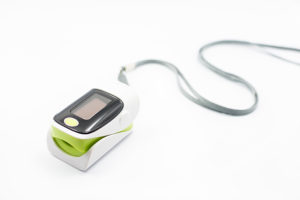I was fascinated to read Dr. Derrick Lonsdale’s article Dysautonomia and Hypoxia. It really gave me pause, to think that keeping our oxygen levels in a normal range would help with “panic attacks” or the dreaded daily “fight or flight” response that seems to be attacking the core of every human in our modern society.

Pulse Oximeter
Dr. Lonsdale’s hypothesis that symptoms of hypoxia and dysautonomia (group of diseases where the autonomic nervous system does not work properly, like your heart rate and breathing) are not being recognized or being ignored is concerning.
So if you’re wondered if your oxygen levels are low (and WHY) could this be the missing piece of your fatigue, brain fog, shortness of breath, dizziness, or sense of dread?
So how does it all tie together?
Red Blood cells carry hemoglobin which carries oxygen. The more red blood cells you have, the more you can carry oxygen. Hemoglobin actually carries the oxygen. More hemoglobin, the more oxygen transport. Red blood cell count (and hemoglobin) are usually run in a Complete Blood Count (CBC) lab work and would help to determine if you are hypoxic. Low iron or iron stores can cause less oxygen utilization because oxygen binds to iron molecules (heme). Check to see if you have anemia.
You can use a Pulse Oximeter, a small device placed on the finger that measures oxygen saturation.
Low blood pressure is a measure of blood flow. You could have great RBC’s, hemoglobin, and oxygen saturation (measured by a Pulse Oximeter) but if your blood pressure is low, blood is not flowing with a certain force and pressure to move it to reach the brain. Too high blood pressure, the blood is thick requiring more force to move it. (Your blood pressure should be 110-120/70-80)
Cold hands and feet? It could be low T3 affecting your metabolism, or blood is not getting to your peripheral body or brain. Nasal or sleep apnea can be the culprit, along with chronic inflammation, and chronic stress. Even a lack of sunlight or UV rays can affect your oxygen levels.
How Functional Medicine and Supplementation Can Help
Evidence-based supplements have been shown to help with anemia, low blood pressure, stress, enhancing oxygen, and circulation
- Thiamine/ B1 – (as Dr. Lonsdale advocates) for nerves, heart, muscle, and kidney
- Magnesium – supports more than 300 biochemical pathways in your system
- Niacin – helps with circulation and blood vessels
- Vitamin B3 – helps support healthy carb and fat metabolism
- Curcumin – great anti inflammatory.
- Iron (in the form of bisglycinate) – a true protein/iron complex, highly absorbable, and does not induce iron-related digestive distress or free radical problems. Oxygenates the blood. Check that it contains folate, B12, and B6 .
- N-acetyl cysteine (NAC) – an amino acid and precursor of glutathione, another potent antioxidant that prevents free radical damage, also helps with various lung conditions
- Astragalus and Rhodiola – which are adaptogens for supporting the stress response.
Other important considerations include laying off the empty calorie, sugary foods and beverages. They literally suck the oxygen (life) out of you and make you feel angry… not a personality change, a biochemical change as stated by Dr. Lonsdale.
Thank you, Dr. Lonsdale, for bringing to light your brilliant and transformational article on Dysautonomia and Hypoxia. I know your message will bring clarity to so many people baffled by what seems like such an insidious condition.





